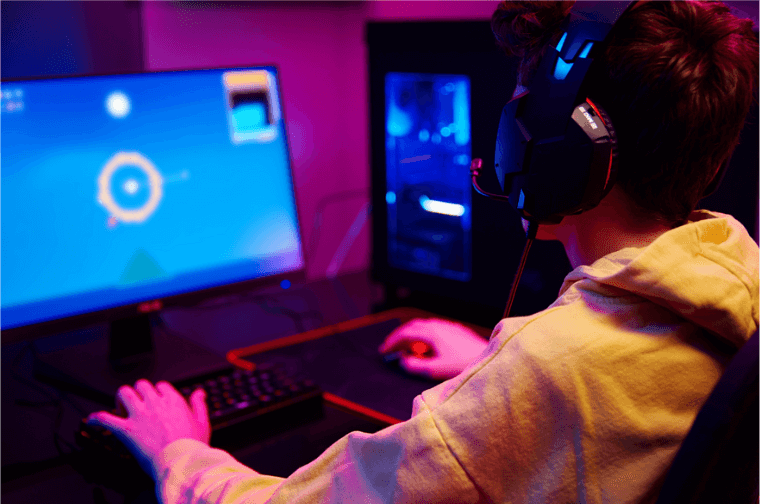The video game industry has always been at the forefront of technological innovation. With its ever-expanding reach and enormous economic impact, this sector is experiencing a groundbreaking transformation fueled by the advancement of artificial intelligence (AI). Technology companies are harnessing the potential of AI in video games to deliver more immersive experiences to their users.
From the early days of pixelated adventures to the lifelike virtual worlds of today, gaming apps have come a long way. In this blog post, we will delve into the role of artificial intelligence in video games and explore how it is revolutionizing the gaming landscape.
Role of artificial intelligence in gaming
According to a Statista report, the revenue derived from the global gaming market was estimated to reach a staggering 347 billion U.S. dollars. The mobile gaming sector alone claimed the majority, contributing an estimated 248 billion U.S. dollars to the total.
The advancement in AI is driving tremendous growth in this billion-dollar industry. Wondering how? Let’s dive deeper into how AI is reshaping the video gaming industry and how technology companies are using AI to elevate every aspect of the gaming experience.
So, here is how AI helps the gaming industry:
Player behavior analysis (PBA)
AI can analyze player behavior, preferences, and gameplay patterns to personalize the gaming experience. This analysis helps tailor game difficulty, provide personalized recommendations, and create targeted marketing strategies.
So, AI plays a crucial role in PBA in several ways, including:
- Collecting data: AI can collect data such as tracking player movements, actions, and decisions. This data can be used to create individual players’ profiles and identify patterns in player behavior.
- Analyzing data: AI can be used to understand player preferences, motivations, and challenges.
- Predicting behavior: Machine learning can be used to identify patterns that can be used to predict the future behavior of the player.
- Personalizing the game experience: This can be done by using data about player behavior to adjust the game difficulty, provide recommendations for content, or even create custom game levels.
Some examples of video games that use AI for PBA:
- League of Legends: It uses AI to track player behavior and match players with opponents of similar skill levels. This enables them to deliver personalized content recommendations.
- Call of Duty: This game also harnesses AI algorithms to track player behavior and use the information to balance the game and ensure that players have a fair and enjoyable experience.
PBA can be used to improve the design of video games, make them more engaging and challenging, and provide a better experience for players.
Proactive game testing
AI-driven testing tools can automatically run thousands of test cases, covering various aspects of a game, from graphics and physics to user interfaces. This accelerates the testing process and identifies issues faster than traditional methods.
Moreover, AI in video games can continuously monitor in-game metrics, such as server performance, matchmaking success, and player engagement, to ensure a seamless gaming experience.
In addition, AI can also help predict when game servers or hardware components might fail, allowing for proactive maintenance and minimizing downtime. By automating and enhancing various aspects of quality assurance, AI streamlines game design and development, resulting in more polished, stable, and enjoyable games for players.
Realistic graphics and physics
AI-driven algorithms can enhance graphics rendering and physics simulations in games. Techniques like machine learning-based upscaling, ray tracing, or physics-based animation create more realistic visuals and immersive gameplay.
Simply put, AI in the gaming industry is playing a transformative role. It enables developers to create visually stunning and physically accurate game worlds, pushing the boundaries of immersion and delivering more captivating and lifelike gaming experiences for players.
Preserving fair play: anti-cheat measures
In competitive gaming, keeping things fair and square is essential. That’s where AI in video games comes in as a vigilant protector against cheaters. AI-powered anti-cheat systems play a crucial role in finding and stopping players who try to cheat so everyone can have a fair and fun gaming experience without anyone having an unfair advantage.
Here are some ways that AI algorithms are used to develop anti-cheat systems AI in video games:
- Machine learning can be used to identify patterns of behavior that are indicative of cheating.
- Deep learning can be used to create more sophisticated models that can learn to distinguish between legitimate and cheating behavior.
- Reinforcement learning can be used to create agents that can learn to identify and punish cheating behavior.
- Game theory can be used to model the interactions between cheaters and anti-cheat systems. This will help design anti-cheat systems that are less likely to be circumvented by cheaters.
This teamwork between AI and gaming is changing the industry’s future, ensuring gamers can always enjoy fair and fun games.
How AI experiences adaptive gaming for you
The role of AI in video games for adaptive difficulty is tailoring the gaming experience to individual players. Here’s how it works:
Player Skill Assessment: AI algorithms continually assess a player’s performance in the game. They consider accuracy, speed, and decision-making abilities to gauge the player’s skill level.
Real-time Adjustments: Based on the assessment, the AI dynamically adjusts the game’s difficulty level. If a player finds the game too easy, the AI makes it more challenging by adding formidable enemies or obstacles. Conversely, if a player struggles, the AI eases up to provide a more manageable experience.
Balanced Gameplay: The goal is to keep players engaged and in a state of “flow,” where the game is neither too easy nor too hard. AI ensures that players consistently face challenges that match their skill level, maximizing enjoyment.
Adaptive Enemy Behavior: AI can alter the behavior of in-game enemies. For skilled players, enemies become more intelligent and strategic, while less experienced players face foes with more straightforward tactics.
AI-powered in-game assistance
AI-powered in-game assistance is a type of artificial intelligence (AI) used to help and support players in video games. This can be done in several ways, such as:
- Providing hints and tips: AI gaming can be used to analyze the player’s gameplay and provide hints and tips on improving. This can be helpful for players who are stuck or who are looking for a challenge.
- Giving advice: Artificial intelligence games can also be used to advise players on how to progress through the game or defeat certain enemies. This can be helpful for players who are new to the game or struggling to complete a certain task.
- Personalizing the experience: AI in gaming can be used to personalize the game experience for each player. This can be done by considering the player’s skill level, preferences, and playstyle.
- Enhancing the immersion: AI in the gaming industry can be used to create a more realistic and believable environment. This can be done by generating realistic dialogue for non-player characters (NPCs) or creating dynamic weather effects.
AI-powered in-game assistance is a rapidly developing field, and there are many new and innovative ways that AI is used to improve the gaming experience.
Benefits of AI in video games
Artificial intelligence has ushered in a new era of gaming, offering a wide range of benefits that enhance the player experience, streamline game development, and open up exciting possibilities. Here are the top benefits of AI in gaming:
- More personalized gameplay
- Immersive Graphics and Physics
- Intelligent NPCs
- Efficient content streaming
- Improved in-game assistance
- Dynamic storytelling
- Real-time Analytics
- Reduced cost & time of AI game development
- Predictive maintenance
These benefits collectively contribute to more immersive, engaging, and enjoyable gaming experiences while streamlining development processes and maintaining the integrity of competitive gameplay. AI is reshaping the gaming industry, offering endless potential for innovation and growth.
The future of the AI-driven gaming industry
The future of AI in the gaming industry is incredibly promising and poised to bring about significant advancements and innovations. Here are some critical aspects of what the future holds:
Gaming in the Clouds: In this fusion of AI and cloud-based technology, players can experience the thrill of gaming without downloading or installing the game on their devices.
Blockchain-powered play: Together, AI and blockchain have the potential to reshape the gaming landscape, offering players more immersive and authentic gaming experiences while providing developers with innovative tools and revenue streams.
Voice Recognition: Players can now control their gaming experiences through voice commands, redefining interactivity and immersion in the gaming world.
Wearable Gaming: Utilizing AI in wearable and VR gaming enhances immersion by generating realistic environments and character behaviors, making virtual worlds come to life.
Wrap up
The impact of AI in video games is nothing short of revolutionary. As we’ve explored throughout this blog, AI in video games is reshaping the entire gaming landscape. From crafting intelligent NPC behaviors and procedural content generation to analyzing player behavior and enabling immersive natural language interactions, AI enhances every aspect of the gaming digital experience.
As technology companies continue to harness the power of AI gaming, we can expect a future where gaming becomes even more immersive, dynamic, and engaging than ever before. So, are you ready to become part of this multi-billion-dollar sector and contribute to the exciting future of AI in video games with our AI development services?
Frequently asked questions
AI in gaming helps enhance player experiences, create realistic NPCs, automate content generation, personalize gameplay, improve graphics, ensure fair play, and streamline game development processes.
AI gaming will revolutionize the gaming industry by delivering more immersive and personalized gaming experiences and improving game design and development efficiency.
AI stands for “Artificial Intelligence” in games, which refers to using intelligent algorithms and techniques to enhance various aspects of gameplay.
Artificial intelligence plays a crucial role in game design by enhancing non-player character behavior, automating content generation, and personalizing gameplay based on player behavior.
Yes, AI can make games by automating the process of generating game content, including levels, maps, quests, and gameplay mechanics, using procedural content generation (PCG) techniques.

Vishal Patel
Vishal Patel is an experienced Solution Consultant with a proven track record in the information technology and services industry.
